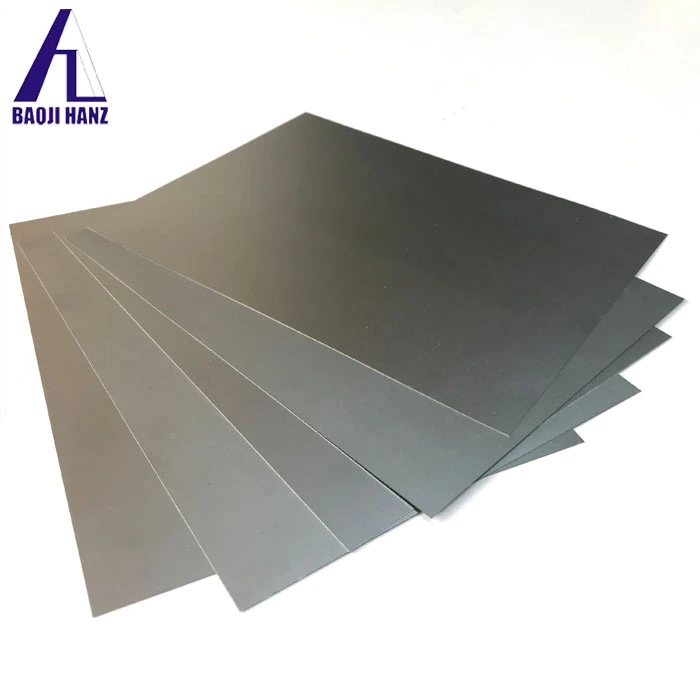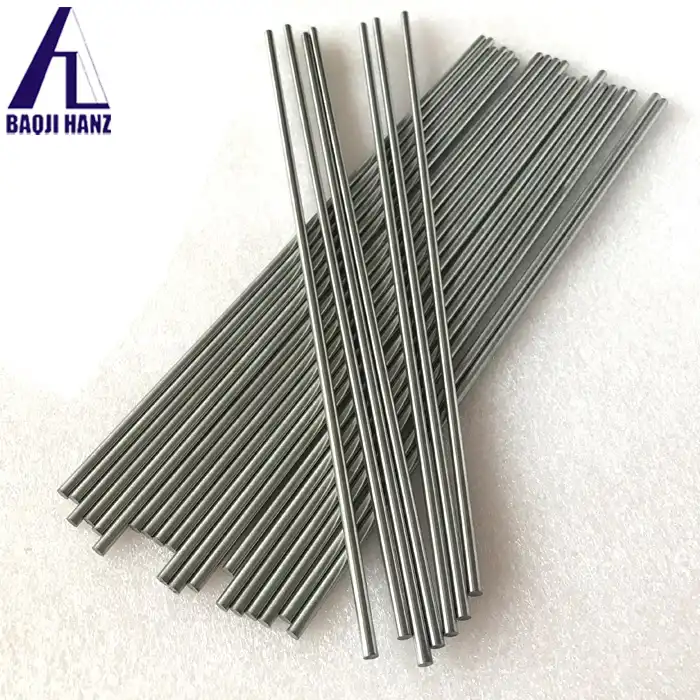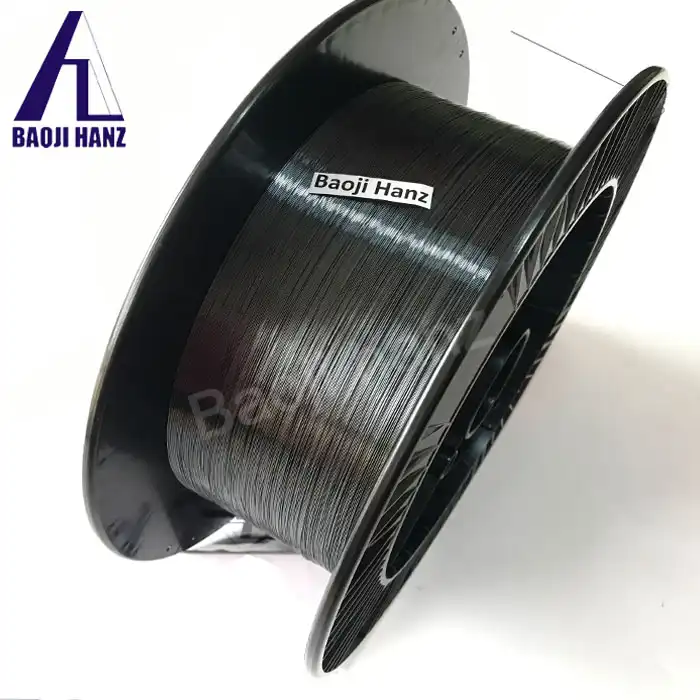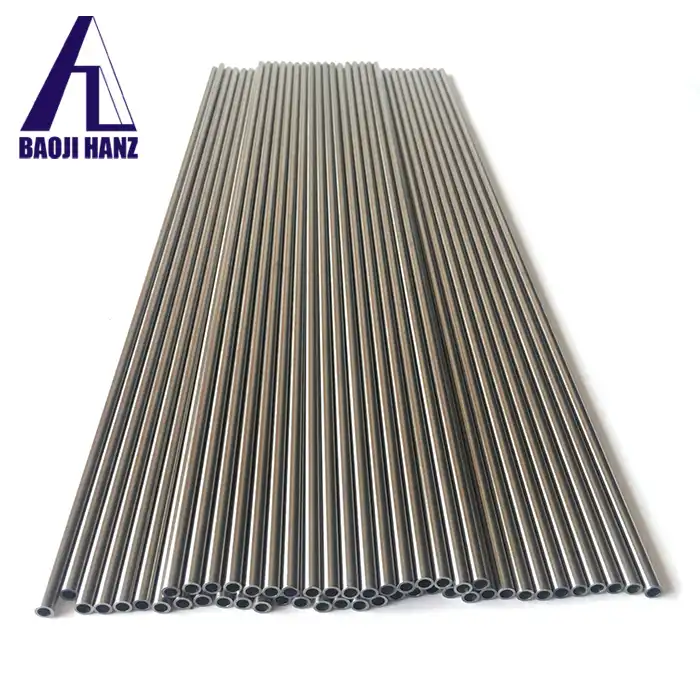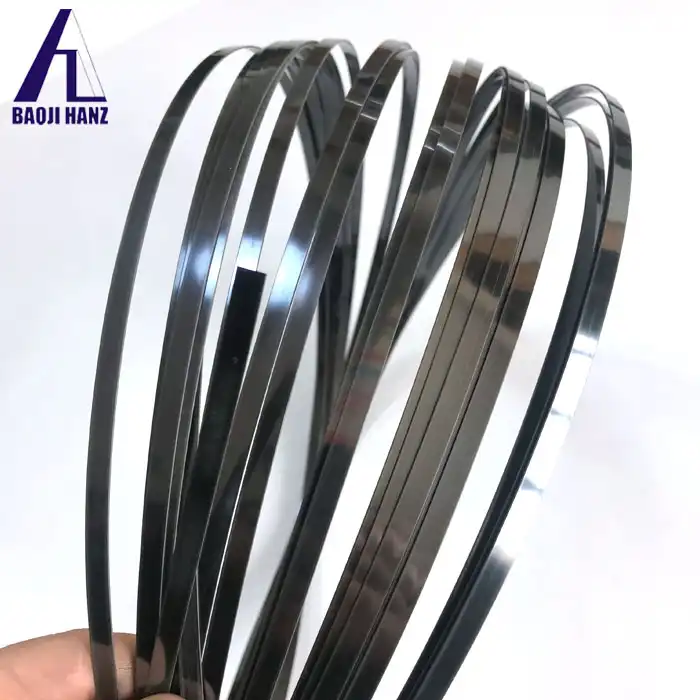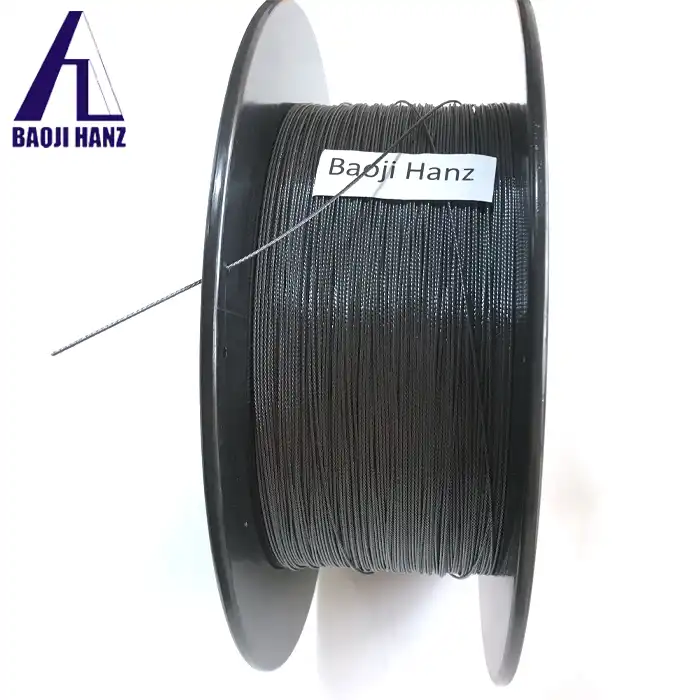What is Medical Superelastic Titanium Nickel Alloy Wire Used For?
2025-04-11 14:53:00
Medical superelastic titanium nickel alloy wire, an innovative material developed to enhance medical device performance, has revolutionized numerous healthcare applications. This specialized wire combines unique properties of superelasticity and shape memory that make it indispensable for modern medical procedures. The material's exceptional flexibility, coupled with its impressive tensile strength and biocompatibility, has established it as a critical component in medical devices that require precise mechanical performance under challenging physiological conditions. As healthcare demands more sophisticated, minimally invasive procedures, medical superelastic titanium nickel alloy wire continues to enable new treatment approaches that benefit both practitioners and patients.
Applications in Cardiovascular Medicine
Vascular Stents and Stent Delivery Systems
Medical superelastic titanium nickel alloy wire has transformed the field of interventional cardiology by enabling the development of self-expanding vascular stents. These devices rely heavily on the wire's unique combination of flexibility, elasticity, and shape memory properties to provide effective treatment for various cardiovascular conditions. The superelastic properties allow stents to be compressed into delivery catheters and then expand to their predetermined shape once deployed in blood vessels, maintaining constant outward pressure against vessel walls to prevent restenosis. Baoji Hanz Metal Material Co., Ltd., located in Baoji Titanium Valley Nonferrous Metals Base, manufactures these wires with strict adherence to international standards, offering diameters ranging from 0.1mm to 5mm to accommodate different vessel sizes and locations. Their medical-grade NiTi wire exhibits high superelasticity, ensuring flexibility and resilience critical for cardiovascular applications. The material's biocompatibility meets medical-grade safety standards, minimizing the risk of adverse reactions when used in long-term implantable devices. Additionally, the wire's exceptional fatigue resistance makes it ideal for applications where repeated mechanical stress occurs with each heartbeat, providing reliable performance throughout the patient's lifetime.
Guidewires for Catheterization
Cardiovascular guidewires represent another critical application of medical superelastic titanium nickel alloy wire, serving as the foundation for numerous catheter-based interventions. These thin, flexible wires navigate through complex vascular pathways to guide catheters to target locations for diagnosis or treatment. The superelastic properties of the NiTi wire provide both the necessary flexibility to maneuver through tortuous vessels and the torsional stability required for precise control during procedures. Physicians rely on these guidewires to access difficult-to-reach areas with minimal trauma to vessel walls. Baoji Hanz Metal Material Co., Ltd. produces these specialized guidewires with precision manufacturing techniques that ensure tight dimensional tolerances for consistent performance. Their products exhibit excellent corrosion resistance, withstanding exposure to body fluids and sterilization processes, which prolongs device lifespan and ensures patient safety. The high strength-to-weight ratio of their NiTi wire ensures lightweight yet robust performance, allowing for delicate procedures while maintaining sufficient pushability to advance through resistant lesions. With customization options available through their OEM services, medical device manufacturers can specify exact dimensions, surface finishes, and mechanical properties to optimize performance for specific cardiovascular applications.
Embolic Protection Devices
Embolic protection devices represent a sophisticated application of medical superelastic titanium nickel alloy wire in preventing stroke and other embolic complications during cardiovascular procedures. These devices utilize the unique properties of NiTi wire to create expandable filters or baskets that capture embolic debris released during interventions like carotid artery stenting or valve replacement. The wire's superelasticity allows these devices to conform to vessel contours while maintaining porosity for blood flow. Baoji Hanz Metal Material Co., Ltd. supplies medical-grade NiTi wire with specific shape memory properties that enable these devices to deploy reliably in the anatomically challenging environments. Their manufacturing process ensures consistent wire performance with fatigue resistance suitable for repeated mechanical stress during deployment and retrieval phases. The technical features of their NiTi wire, particularly its ability to recover its original shape after deformation, make it ideal for creating complex filter geometries that expand and collapse predictably. With ISO13485:2016 and CE certifications, their products meet the stringent quality requirements necessary for these critical safety devices. The company's large ready stock and flexible minimum order quantity (MOQ) of just one piece enable device manufacturers to prototype and test different designs efficiently, accelerating the development of next-generation embolic protection technologies that continue to improve patient outcomes in high-risk cardiovascular procedures.
Orthopedic and Spinal Applications
Scoliosis Correction Systems
Medical superelastic titanium nickel alloy wire has revolutionized the treatment of scoliosis and other spinal deformities through innovative correction systems that leverage its unique mechanical properties. These systems utilize the controlled force delivery capabilities of NiTi wire to gradually correct spinal curvatures without the rigidity associated with traditional rods and screws. The wire's superelasticity allows it to exert constant, gentle pressure on the spine over extended periods, promoting more physiological correction with reduced patient discomfort. Baoji Hanz Metal Material Co., Ltd. has developed specialized superelastic titanium-nickel alloy wires specifically designed for this orthopedic application, with diameters ranging from 0.5mm to 2mm to accommodate different patient populations and curve severities. Their manufacturing process ensures precise control of transformation temperatures, allowing the wire to maintain optimal corrective forces at body temperature while remaining malleable during surgical placement. The shape memory effect of their NiTi wire enables innovative treatment approaches where the implant can be programmed to gradually straighten as it warms to body temperature after implantation. With fatigue resistance suitable for the long-term cyclic loading experienced during daily activities, these wires provide durable performance throughout the correction period. The company's ISO9001:2015 certified production processes ensure consistent mechanical properties across production batches, giving surgeons confidence in predictable clinical outcomes when utilizing these advanced materials in complicated spinal reconstruction procedures.
Fracture Fixation Devices
In orthopedic trauma care, medical superelastic titanium nickel alloy wire has transformed fracture fixation through devices that provide dynamic compression and stabilization. Unlike traditional rigid fixation systems, NiTi-based implants accommodate micromotion at fracture sites, which research suggests may stimulate osteogenesis and promote faster healing. These devices exploit the wire's superelastic plateau to maintain constant compression across fracture fragments despite bone resorption and formation during the healing process. Baoji Hanz Metal Material Co., Ltd. produces medical-grade NiTi wire with carefully controlled superelastic properties that make it ideal for manufacturing intramedullary fixation devices, compression staples, and flexible intramedullary nails. Their precision manufacturing ensures tight dimensional tolerances for consistent performance in these critical applications where even slight variations could affect clinical outcomes. The biocompatibility of their NiTi materials meets medical-grade safety standards, minimizing rejection risk in long-term implantations. The corrosion resistance of their wire withstands the challenging biochemical environment within the human body, preserving mechanical integrity throughout the healing period. With customization options available through their OEM services, orthopedic device manufacturers can develop patient-specific or anatomy-specific solutions that optimize fracture management. The high strength-to-weight ratio of their NiTi wire ensures implants remain lightweight while providing robust mechanical support, improving patient comfort without compromising stability. This combination of properties has made medical superelastic titanium nickel alloy wire an increasingly popular material choice for innovative fracture fixation technologies that aim to improve both healing outcomes and patient experience.
Spinal Fusion Cages and Spacers
The exceptional properties of medical superelastic titanium nickel alloy wire have enabled significant advancements in spinal fusion implants, particularly in the development of expandable cages and spacers that adapt to individual patient anatomy. These devices leverage the wire's superelasticity to create structures that can be compressed for minimally invasive delivery and then expanded in situ to restore disc height and provide stable fusion platforms. The ability of NiTi wire to undergo significant deformation while maintaining elastic recovery makes it uniquely suited for these applications, where the implant must deliver consistent biomechanical performance throughout the fusion process. Baoji Hanz Metal Material Co., Ltd. supplies specialized grades of medical superelastic titanium nickel alloy wire that meet the demanding requirements of these spinal implants, with carefully controlled transformation temperatures that enable reliable deployment at body temperature. Their manufacturing process ensures consistent material properties that translate to predictable expansion behavior, giving surgeons confidence in achieving targeted correction and stabilization. The durability of their NiTi wire, which remains resistant to corrosion and fatigue even in challenging biological environments, makes it ideal for the long-term implantation necessary for successful fusion. With ISO13485:2016 certification, their products meet the stringent quality standards required for permanent implantable devices. The company's technical expertise in controlling the shape memory effect allows device manufacturers to design innovative expandable fusion systems that conform to the unique contours of vertebral endplates, potentially improving osteointegration and long-term stability. As minimally invasive spine surgery continues to evolve, the unique properties of medical superelastic titanium nickel alloy wire from suppliers like Baoji Hanz remain fundamental to enabling new treatment approaches that minimize surgical morbidity while maximizing clinical outcomes.
Dental and Orthodontic Implementations
Orthodontic Archwires
Medical superelastic titanium nickel alloy wire has revolutionized orthodontic treatment through the development of archwires that deliver gentle, consistent forces to achieve tooth movement with enhanced patient comfort. Unlike traditional stainless steel wires that deliver declining forces as teeth move, NiTi archwires maintain relatively constant force delivery throughout a wide range of deflections, enabling more efficient tooth movement with fewer adjustments. The superelastic properties of these wires allow orthodontists to engage severely misaligned teeth that would be difficult to treat with conventional wires, expanding treatment possibilities for complex cases. Baoji Hanz Metal Material Co., Ltd. manufactures a comprehensive range of medical superelastic titanium nickel alloy wires specifically designed for orthodontic applications, with diameters typically ranging from 0.012 to 0.022 inches and various cross-sectional profiles to accommodate different treatment phases and techniques. Their production facilities employ advanced drawing and heat treatment processes to achieve precise control over transformation temperatures, ensuring optimal performance in the oral environment. The superelasticity of their NiTi wire ensures flexibility and resilience critical for initial alignment phases, while its biocompatibility meets medical-grade safety standards for prolonged intraoral use. The company's strict quality control measures, validated through ISO9001:2015 and ISO13485:2016 certifications, ensure consistent mechanical properties batch after batch, giving orthodontists confidence in predictable clinical outcomes. With customization options available through their OEM services, Baoji Hanz can produce specialty wires with modified superelastic plateaus or transformation temperatures tailored to specific treatment approaches, enabling orthodontic companies to develop proprietary archwire systems that differentiate their products in the competitive orthodontic market.
Endodontic Files and Instruments
Medical superelastic titanium nickel alloy wire has transformed endodontic practice through the development of rotary and reciprocating files that effectively negotiate curved root canals while minimizing procedural errors. The extraordinary flexibility of NiTi endodontic instruments allows them to follow complex canal anatomies while maintaining their cutting efficiency, dramatically reducing the risk of ledging, transportation, and perforation compared to traditional stainless steel files. This enhanced safety profile, combined with increased cutting efficiency, has enabled faster and more predictable root canal treatments. Baoji Hanz Metal Material Co., Ltd. supplies specialized grades of medical superelastic titanium nickel alloy wire that meet the demanding requirements of endodontic instrument manufacturers, with tightly controlled material properties that ensure consistent performance in these precision applications. Their manufacturing process focuses on achieving the optimal balance between flexibility and cutting efficiency, with careful attention to transformation temperatures that affect instrument behavior at body temperature. The fatigue resistance of their NiTi wire, particularly important for rotary instruments subjected to cyclic loading in curved canals, enables these instruments to withstand the stresses of multiple canal preparations before failure becomes likely. The high precision manufacturing capabilities at Baoji Hanz ensure tight dimensional tolerances for consistent performance, critical for instruments where even minor variations could affect cutting dynamics and fracture resistance. As endodontic technology continues to evolve toward more minimally invasive approaches, the company's ability to provide customized wire specifications through their OEM services allows instrument manufacturers to develop next-generation file systems with innovative features such as adaptive motion, progressive tapers, or specialized heat treatments that further enhance safety and efficiency in challenging cases.
Dental Implant Components
The unique properties of medical superelastic titanium nickel alloy wire have enabled significant innovations in dental implantology, particularly in the development of components that accommodate the biomechanics of mastication while promoting osseointegration. Although titanium remains the primary material for implant fixtures, NiTi alloys have found specialized applications in implant superstructures, temporary abutments, and stress-distributing elements that mitigate excessive occlusal forces. These components leverage the superelastic behavior of NiTi to create more physiological load transfer to surrounding bone, potentially reducing stress shielding and preserving bone density around implants. Baoji Hanz Metal Material Co., Ltd. manufactures medical-grade superelastic titanium nickel alloy wire with properties specifically optimized for dental applications, where biocompatibility and mechanical stability under cyclic loading are paramount considerations. Their production processes ensure materials meet the stringent purity requirements necessary for long-term oral use, with comprehensive testing to verify freedom from problematic impurities that could affect biocompatibility. The technical features of their NiTi wire, particularly its shape memory effect and fatigue resistance, make it ideal for creating implant components that can absorb and distribute masticatory forces more naturally than rigid materials. The corrosion resistance of their alloys withstands the challenging environment of the oral cavity, maintaining structural integrity despite exposure to varying pH levels and chemical conditions. With ISO13485:2016 certification, their manufacturing processes meet international standards for medical device production. As dental implant systems continue to evolve toward more biomimetic designs that better replicate natural tooth function, Baoji Hanz's ability to produce customized NiTi wire specifications through their OEM services enables implant manufacturers to develop innovative components that may improve long-term success rates, particularly in challenging clinical scenarios with compromised bone quality or high biomechanical demands.
Conclusion
Medical superelastic titanium nickel alloy wire has established itself as a transformative material in modern healthcare, enabling advances across cardiovascular, orthopedic, and dental specialties. Its unique combination of superelasticity, shape memory, biocompatibility, and durability continues to inspire new medical device innovations that improve patient outcomes through less invasive, more effective treatments.
Are you developing cutting-edge medical devices that could benefit from high-quality nitinol components? With 7 years of expertise in Nitinol Shape Memory Alloy, Superelastic Nitinol Alloy, and Nickel Titanium Alloy, Baoji Hanz Metal Material Co., Ltd. offers unmatched quality and customization capabilities. Save significantly with our direct supply chain advantages while enjoying rapid fulfillment from our extensive inventory of standard sizes. Our OEM services can tailor solutions precisely to your specifications—whether you need custom diameters, specific transformation temperatures, or specialized surface treatments. Contact our engineering team today at baojihanz-niti@hanztech.cn to discuss how our medical-grade nitinol wire can elevate your next medical innovation!
Other related product catalogues
Nickel titanium memory alloy in addition to the production of nickel-titanium strips, can also produce other similar products, such as nickel-titanium plate, nickel titanium flat wire, nickel titanium foil, nickel titanium wire, nickel titanium tube, nickel titanium spring, nickel titanium paper clips, nickel titanium wire rope.
|
|
|
|
|
|
|
|
References
1. Duerig, T. W., & Pelton, A. R. (2019). Materials properties of Nitinol for use in medical implants. Journal of Materials Engineering and Performance, 28(3), 1123-1137.
2. Stoeckel, D., Pelton, A., & Duerig, T. (2004). Self-expanding nitinol stents: material and design considerations. European Radiology, 14(2), 292-301.
3. Petrini, L., & Migliavacca, F. (2011). Biomedical applications of shape memory alloys. Journal of Metallurgy, 2011, 501483.
4. Miura, F., Mogi, M., & Ohura, Y. (1986). Japanese NiTi alloy wire: use of direct electric current heat treatment of the wire, European Journal of Orthodontics, 8(2), 13-21.
5. Otsuka, K., & Ren, X. (2005). Physical metallurgy of Ti–Ni-based shape memory alloys. Progress in Materials Science, 50(5), 511-678.
6. Machado, L. G., & Savi, M. A. (2003). Medical applications of shape memory alloys. Brazilian Journal of Medical and Biological Research, 36(6), 683-691.

